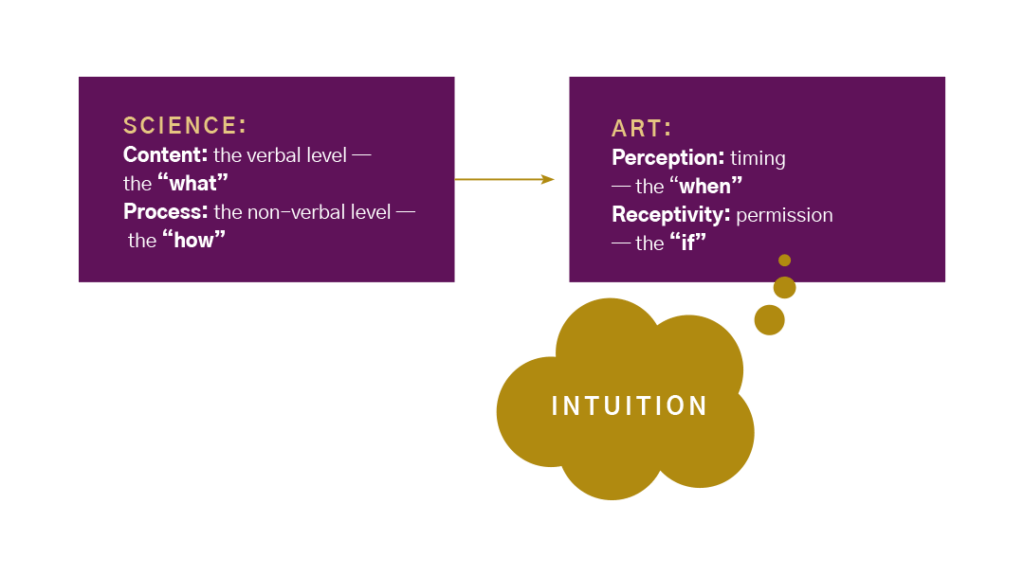In a previous article called Science and Art of Coaching, I shared a model by Michael Grinder that inspired the name of our ICF accredited coaching education programme. In his model, Michael shares how, as we develop, we initially focus on the “science” or technique of what we are learning. In this phase, we are seeking to become knowledgeable, confident, and proficient at knowing “what” to do and “how”. As we become increasingly competent with our foundational understanding of our craft, we then transition towards becoming more artistic in our work. At this stage, “when” and even “if” to do anything at all becomes very relevant.
How do we know when and if to intervene as a coach?
- How do we know when to ask a question or just hold the space?
- How do we know when to probe more deeply?
- How do we know if it would be helpful for us to offer our perspective or if that could just get in the way and simply interrupt the client’s own train of thought?
There is no simple or single answer to these questions… for what we must draw upon is our intuition.

The International Coaching Federation’s Core Competencies highlight intuition in Core Competency Two: Embodies a Coaching Mindset: The Coach “uses awareness of self and one’s intuition to benefit clients”. We therefore know this is an important tool or quality that we can draw upon and yet we also know that it comes with a “proceed with caution” label, as our intuition may not always be correct, and it is also human nature to become quite attached to our intuitive responses – neither of which are likely be of much benefit our clients. In this blog, we will explore what is intuition, where it comes from, how we can mistake it for something else and how to develop and use it most effectively.
What is Intuition?
Here are some widely available words that define intuition:
Intuition is the ability to acquire knowledge without recourse to conscious reasoning. Different fields use the word “intuition” in very different ways, including but not limited to: direct access to unconscious knowledge; unconscious cognition; gut feelings; inner sensing; inner insight to unconscious pattern-recognition; and the ability to understand something instinctively, without any need for conscious reasoning. Intuitive knowledge tends to be approximate.
The word intuition comes from the Latin verb intueri translated as “consider” or from the late Middle English word intuit, “to contemplate”. Use of intuition is sometimes referred to as responding to a “gut feeling” or “trusting your gut”.
When exploring intuition with coach training students, word such as: instinct, hunch, impression, trust, and gut feel are also often noted.
The question of “nature or nurture” can also emerge…are we born with intuition? If so, do we all get the same amount of it, or some more than others? Or can it be developed through experience?
Is there just one kind of intuition or do we have emotional and/or intellectual intuition?
Where Does Intuition Come From?
With the many and varied ways that intuition is articulated, there seem to be three key aspects that emerge which is that our intuition can be triggered by external factors perceived by our senses of taste, smell, touch, hearing, and sight (exteroception). It can also present as bodily or somatic sensations that we feel inside our bodies, such as subtle changes in our body temperature, breathing or heart rate (interoception). Intuition can also appear simply a sense of knowing that comes to us from somewhere outside of ourselves(proprioception).
Part of developing and effectively using our own intuition, is to get to know it a little better!
- Are you aware when your intuition is “speaking” to you?
- Where do you feel it?
- What do you feel?
- Does it evolve or change?
- Do you have an unconscious strategy for accessing and using your intuition?
When exploring this with colleagues, here are some things that people have shared:
“My intuition usually starts with an emotion, like excitement or nervousness, I notice a sensation in my tummy, butterflies…and sometimes my head can feel fizzy too if it is a strong feeling…”
“I get a tightening in my stomach first, then my head quickly engages, I can initially feel some confusion and then things seem to clear, and I make a choice”
“I feel a “rush” in my chest, quite energetic, moving upwards and then I find myself gazing out of the window and I just know something, I can “see” it”
As part of your own reflective practice, perhaps you could try being more mindful when your intuition comes to you; to notice it more precisely, to notice what happens to your physical sensations, your thinking, your feelings, anything else?
The more you can understand, recognise, and engage with your own intuition, the more you can begin to evaluate and potentially leverage it for most positive impact.
Is It Really Your Intuition or Something Else?
There are differing perspectives and views on how reliable our intuition actually is. This can create problems, especially when we factor in that, as human beings, we can often become quite attached to our intuition, and it can quickly become a “truth”. A perspective of intuition could be that it is in fact simply the rapid product of us considering a stimulus or situation against the backdrop of our own vast inner world of experiences, beliefs, values, and biases etc. In this case, our intuition is heavily weighted by “us” and this needs to be borne in mind when we are seeking to use this tool for our clients benefit and remain client-centred.
Then there is another complexity… and that is, how do we know that what we are experiencing is truly our intuition and not something else that we are mistaking for intuition? For example, when my intuition tells me not to take a new job opportunity, is that truly my inner wisdom, my intuition speaking to me? Or could it simply be fear, because the role is much more senior, with a higher salary and my self-doubt or imposter syndrome has reared its head? Is what I am noticing really my intuition communicating with me or is it just that I am incredibly excited about something? When I feel the urge to offer something to my client by way of my perception or a suggestion, it is really my intuition and is something that would benefit my client, or is it simply my own ego jumping up and down a little because we are talking about a topic that I know something about or have opinions around?
Pros and Cons
There are of course advantages and disadvantages to using our intuition in coaching. It can be incredibly thought-provoking for clients, evoking new awareness and offering different perspectives that might be instrumental in client’s learning and a “shift” in their thinking, feeling and/or behaving. On the other hand, it could be of no value at all (which is why we offer without attachment and for the client to respond in any way to our offering) or it could even interrupt their own processing in an unhelpful way, potentially impacting the benefit of the work we are doing together and indeed the rapport and relationship that we have co-created.
Developing and Using your Intuition
Apart from getting to know how our intuition tends to present itself, it is also very helpful if we can check in with ourselves, to self-regulate and ask ourselves, where is this really coming from, what might it really mean? For this we need time…hence the need to slow down and embrace the use of silence, pause and reflection in our coaching practice – this golden time is not only for our clients’ benefit, but also for our benefit, to give us the opportunity to really consider “when” and “if” to bring out intuition into the coaching space.
Moreover, how might you use your intuition to know when and if to use your intuition?
Resources:
- Your Body is Your Brain by Dr. Amanda Blake
- Free resources from embright: https://embright.org/free-resources/
- Blink by Malcolm Gladwell
Coach Advancement by Tracy Sinclair supports organisations to develop the potential of their people through coaching, coaching skills and coaching culture. Our Coaching with Conscience services specialise in offering coaching and coaching related services in support of positive social impact and social progress.

Tracy Sinclair is a multi-award-winning Master Certified Coach (MCC) with the International Coaching Federation (ICF). She is also a trained Coaching Supervisor, Mentor Coach and ICF Assessor. Tracy trains coaches and works with managers and leaders to develop their coaching capability. She works as an international Corporate Executive and Board Level Coach, a leadership development designer and facilitator working with a wide range of organisations. Tracy also specialises in working with organisations to support them develop coaching culture. Tracy has co-authored a book Becoming a Coach: The Essential ICF Guide published in 2020 which provides a comprehensive guide to coaching for coaches at all levels of skill and experience, the psychology that underpins coaching and the updated ICF Core Competency Model. In this same year she founded Coaching with Conscience which exists to have a positive impact on society and our environment through coaching. As part of this work, she collaborates closely with MIND, the UK’s leading mental health charity and the British Paralympic Association (BPA). She also offers pro bono personal development and coaching programmes to young leaders (18-25-yrs). Tracy was named as one of the Leading Global Coach winners of the Thinkers50 Marshall Goldsmith Awards of 2019 and was a finalist for the Thinkers50 Coaching and Mentoring Award in 2021. She won the ICF Impact Award for Distinguished Coach in 2023 and is a member of the Marshall Goldsmith 100 Coaches. She was the President of the UK ICF from 2013-2014 and was an ICF Global Board Director since 2016, serving as Treasurer in 2017, Global Chair in 2018 and Immediate Past Global Chair in 2019 and Vice Chair and Director at Large on the International Coaching Federation Global Enterprise Board in 2021.
Share This Post!
Sign up for additional resources, opportunities and updates!
Delivered straight to your inbox.







